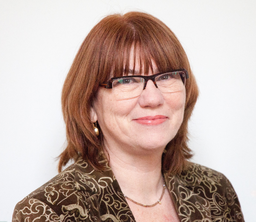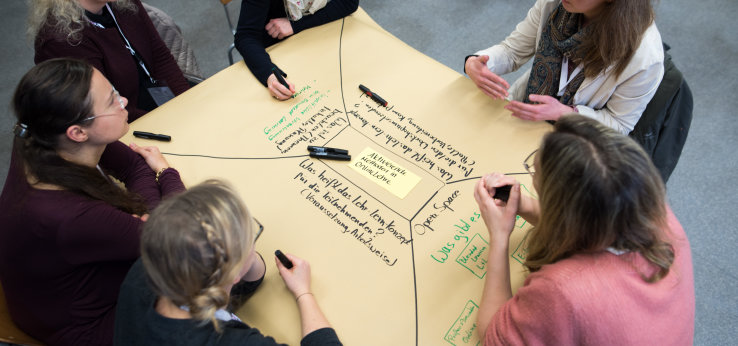Initiatives
Do you have an interesting idea you would like to develop and implement in your teaching? Or would you like to refine a concept, test it, and evaluate it? Regardless of your discipline, one of our experienced experts in the competence team for higher education will provide you with useful feedback and support at every stage of your personal teacher-development process.
Initiatives are launched whenever teachers with innovative ideas seek advice on teaching methodology and look for individual consultation for a particular project. Research-based learning—that is, teachers researching issues of teaching methodology—is one of the possible approaches. Whether you are looking for innovative ways to carry out a new module in a study program, want to redefine your role as a teacher, are searching for different ways to guide self-study, or want to integrate “flipped classroom” into your lectures, we will support you, and provide constructive criticism and feedback.
This cooperation may result in a joint publication, a candidature for the teaching award, or some other form of publication. This not only offers interested colleagues the opportunity to benefit from your questions, ideas, and solutions, but also contributes to exchange among colleagues and promotes a culture of excellence in teaching.
Your initiative?
Do you have an interesting idea you would like to develop and carry out in your teaching? Or would you like to refine a teaching concept, put it to the test, and evaluate it? Regardless of your discipline, one of our experienced experts in the competence team for higher education will provide you with useful feedback and support at every stage of your personal teacher development.
Call us, visit us, or write to us!
Previous initiatives
Berlin field trip
In charge of lecturing, field trip, and learning outcomes two teachers handed over lecture responsibilities to their students, a task that until then had been planned and carried out by the teachers. Before handing over any of these tasks to the students, the teachers had to plan for and answer a number of questions, such as “When and where should we get involved/when and where should we step in?”
Flipped classroom
Prompted by a discussion about the concept of the flipped classroom during the “Tag für die exzellente Lehre” (Excellence in Teaching-Day), Prof. Kampmann and B.Eng. Lotz-Blumberg approached the competence team academic development to find out how they could improve their own previous (bad) experience with flipped classroom in order to make it better.
Foundation courses 2.0
One of the introductory courses in Business Administration requires students to write a business plan. This project establishes early on a link between theory and practice through project-based learning. Students are supervised by Professor Bentler, Professor Hölter, Professor Prokop and Mr. Krippendorf. The ProfiL² team at the Faculty of Business and Law is equally involved in the process as an advisory body.
Oral examination in projects
For her class on “Digital Media in Social Work”, Prof. Zorn and the competence team academic development jointly developed a teaching and grading concept to effectively measure students’ performance and learning progress during a project-oriented seminar. What we learned by implementing this concept was that by making their own learning progress transparent to the students, it motivated them during the semester.
Problem-based learning with first year students
Until the winter 2012/2013 term, “Introduction to Materials Engineering” had been taught following the classic concept: lecture-seminar-assessment. While Professor Hagen genuinely wanted students to participate, there were only limited possibilities in a large lecture format. Using methods of active group involvement, students were engaged with the material and other students to create a course-level outcome.
PHARMEVOLUTION
PHARMEVOLUTION is an experimental game simulating the development of a pharmaceutical product. The simulation is a graded, mandatory module (“Project”/“Projektpraktikum”, 6 ECTS) carried out during the 5th semester in the undergraduate program Pharmaceutical Chemistry.
The concept was developed in 2014 and carried out for the first time during the winter term 2014/2015 with 45 students (B-Block, 8 weeks).
Engineers learning to moderate project groups
Engineers need much more than technical expertise in their profession: They have to work in projects and teams and must often take on managerial tasks at early stages in their career. In this regard, it is important to ask about how they learn to work in teams and to assume managerial responsibility.
Self-management
Students underestimate the workload required at the university level, and so often have problems managing their time, studying, and grappling with the number of courses they have to take. The module “Self-Management at University” helps students to find strategies aimed at preventing such typical difficulties.
Office hours
By analyzing his own and other professors’ office hours, Prof. Bonnet developed the idea of a specially designed “notepad” for conversations with students during office hours. It allows students and professors to take notes and to have a record of the conversation and a plan with next steps.


